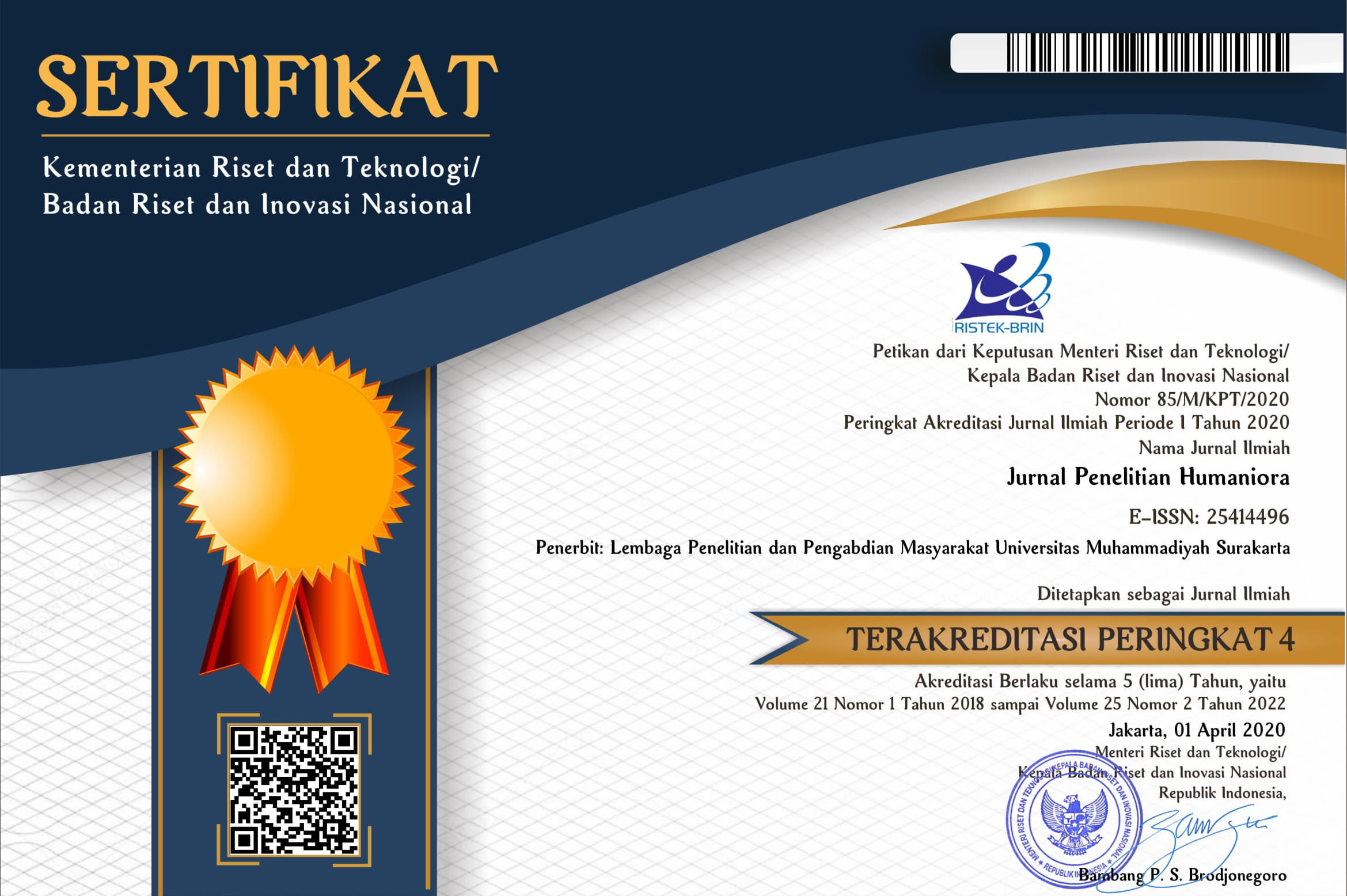NASIONALISME DARI PERSPEKTIF FOUNDING FATHER (SEBUAH ANALISIS PSIKO-HERMENEUTIK)
Muhammad Zulfa Alfaruqy(1*)(1) Universitas Diponegoro
(*) Corresponding Author
Abstract
Keywords
Full Text:
PDFReferences
Abrams, D., & Grant, P. R. (2012). Testing the social identity relative deprivation (SIRD) model of social change: The political rise of Scottish nationalism. British Journal of Social Psychology, 51(4), 674–689. doi: 10.1111/j.2044-8309.2011.02032.x
Alfaruqy, M. Z. (2020). Psikologi nasionalisme: Teori dan riset. Fakultas Psikologi Universitas Diponegoro
Alfaruqy, M. Z., & Masykur, A. M. (2014). Memaknai nasionalisme studi kualitatif fenomenologis pada presiden mahasiswa perguruan tinggi negeri di Jawa Tengah dan Daerah Istimewa Yogyakarta. Jurnal Empati, 53(9), 1689–1699.
Aoki, K. (2012). Name and ethnic identity: experiences of korean women in japan. Journal of Asian and African Studies, 47(4), 377–391. doi: 10.1177/0021909611419943
Aspinall, E. (2016). The new nationalism in Indonesia. Asia and the Pacific Policy Studies, 3(1), 72–82. doi: 10.1002/app5.111
Bayram, A. B. (2019). Nationalist cosmopolitanism: the psychology of cosmopolitanism, national identity, and going to war for the country. Nations and Nationalism, 25(3), 757–781. doi: 10.1111/nana.12476
Branscombe, N. R., & Baron, R. A. (2017). Social Psychology 14th ed. Pearson.
Budiawan. (2017). Nasion & nasionalisme: Jelajah ringkas teoretis. Penerbit Ombak.
Carnegie, P. J. (2019). National imaginary, ethnic plurality, and state formation in Indonesia. The Palgrave Handbook of Ethnicity, 791–807. doi: 10.1007/978-981-13-2898-5_165
Cottam, M. L., Mastors, E., Preston, T., & Dietz, B. (2016). Introduction to political psychology: 3rd edition. Taylor and Francis.
Creswell, J. W., & Creswell. J. D. (2018). Research design qualitative, quantitative, and mixed methods approaches 5th ed. Sage Pub.
Gadamer, H. G. (2004). Truth and method.Continuum.
Harwood, J. (2020). Social identity theory. dalam J.V.D. Bulck, D. Ewoldsen., M.L. Mares., & E. Scharrer (Eds). The international encyclopedia of media psychology (pp 255-272). John Wiley & Sons Inc. doi: 10.1002/9781119011071.iemp0153
Hogg, M. A., Abrams, D., & Brewer, M. B. (2017). Social identity: The role of self in group processes and intergroup relations. Group Processes and Intergroup Relations, 20(5), 570–581. doi: 10.1177/1368430217690909
Houghton, D. P. (2015).Political psychology : situations, individuals, and cases 2nd ed. Routledge.
Hyland, P., Boduszek, D., & Kielkiewicz, K. (2011). Psycho-historical analysis of adolf hitler: the role of personality, psychopathology and development. Psychology and Society, 42(2), 58–63.
Kaufmann, E. (2018). The intellectual legacy of Anthony D. Smith. Nations and Nationalism, 24(2), 237–239. doi: 10.1111/nana.12403
Kelly, C. O. (2018). Nationalism and the state. Political Concepts, 52–64. doi: 10.5840/schoolman193512329
Kerr, W. (2019). The descent of nations: social evolutionary theory, modernism and ethno-symbolism. Nations and Nationalism, 25(1), 104–123. doi: 10.1111/nana.12426
Malik, I. (2017). Resolusi konflik jembatan perdamaian. Penerbit Buku Kompas.
Mila, M, N., & Yustisia, W. (2017).Teori identitas sosial. Dalam A. Pitaloka (Ed), Teori psikologi sosial kontemporer (halm. 73-86). Rajagrafindo Persada.
McCaffrey, G., Raffin-Bouchal, S., & Moules, N. J. (2012). Hermeneutics as research approach: A reappraisal. International Journal of Qualitative Methods, 11(3), 214–229. doi: 10.1177/160940691201100303
Prati, F., Menegatti, M., & Rubini, M. (2015). The beneficial role of multiple categorization and intergroup contact in reducing linguistic out-group derogation. Journal of Language and Social Psychology, 34(5), 475–500. doi: 10.1177/0261927X14567777
Raijman, R., & Hochman, O. (2011). National attachments, economic competition, and social exclusion of non-ethnic migrants in Israel: A mixed-methods approach. Quality and Quantity, 45(6), 1151–1174. doi: 10.1007/s11135-009-9284-1
Scanlon, L. A., & Satish Kumar, M. (2019). Ireland and irishness: The contextuality of postcolonial identity. Annals of the American Association of Geographers, 109(1), 202–222. doi: 10.1080/24694452.2018.1507812
Schrock-Jacobson, G. (2012). The violent consequences of the nation: nationalism and the initiation of interstate war. Journal of Conflict Resolution, 56(5), 825–852. doi: 10.1177/0022002712438354
Schultz, D. P., & Schultz, S. E. (2017). Theories of personality, 11th ed. Cengage Learning.
Soekarno.(2005). Di bawah bendera revolusi. Yayasan Bung Karno.
Syibulhuda, F.M., Prabasari, E.D., Cahyadi, S.D.S., Arsari, N.M.C.D., & Alfaruqy, M.Z.(2019). Pemimpin di mata mahasiswa: Membaca partisipasi mahasiswa dalam kompetisi pemilihan umum presiden tahun 2019. Prosiding Temu Ilmiah Nasional Ikatan Psikologi Sosial Peran Psikologi Sosial dalam Pemecahan Masalah Sosial dan Perencanaan Kebijakan Publik(pp.286-296). Universitas Sebelas Maret.
White, T. J. (2016). Historical sociology in the field: Teaching Irish identity through field experience. Irish Journal of Sociology, 24(1), 54–77. doi: 10.1177/0791603515627045
Zein, R.A. (2018). Quo vadis nasionalisme Indonesia: Refleksi kebangkitan dan tantangan berprestasi. Dalam J. M. J. Ratna, S. Handoyo, H. Panggabean, Y. Y. T. Rahayu (Eds.), 22 Gagasan Psikologi Sumbangan Pemikiran untuk Bangsa (pp. 34-41). Elex Media Komputindo.
Article Metrics
Abstract view(s): 986 time(s)PDF: 869 time(s)
Refbacks
- There are currently no refbacks.











